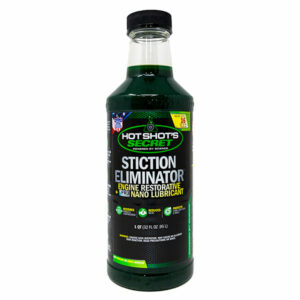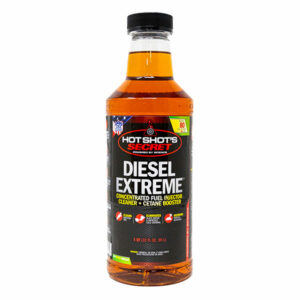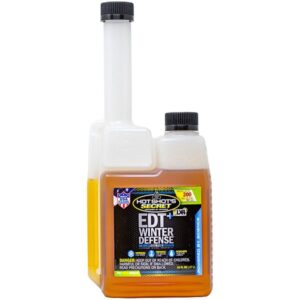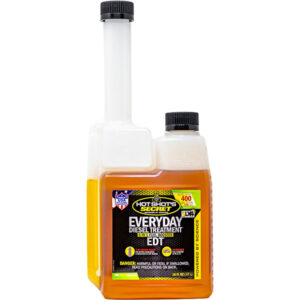Ford 6.0L Powerstroke Fuel Filter Plugged
Causes of a Plugged Fuel Filter With Black Residue in a 6.0L Powerstroke
The accumulation of black residue is a common symptom of a bad fuel filter in a 6.0L Powerstroke, which can come from multiple sources:
Fuel Contamination and Degradation
Diesel fuel degrades over time, leading to the formation of asphaltenes and sludge. These deposits block the filter, restricting fuel flow and affecting injector performance, potentially causing a noticeable loss of power.
Prevention: Using high-quality diesel and incorporating a fuel additive can help stabilize and clean the fuel system, minimizing degradation.
Bacterial and Fungal Growth in the Fuel System
When water enters the fuel system, it creates an ideal environment for bacteria and fungi. The resulting microbial growth produces slimy, black deposits that clog the 6.0L Powerstroke fuel filter, causing injector damage and reducing engine efficiency.
Prevention: Regular treatment of the fuel system with a biocide and fuel system cleaner can prevent microbial buildup.
Water Contamination in Diesel Fuel
Water accumulation in diesel may occur due to condensation, poor storage or substandard fuel sources. Besides promoting microbial growth, water can cause rust, fuel breakdown and a plugged 6.0L Powerstroke fuel filter.
Prevention: Treat the fuel with additives that disperse water and regularly check the tank for signs of water contamination.
Carbon and Soot Buildup From Incomplete Combustion
Incomplete combustion can result in excess soot deposition in the fuel system. Over time, these particles collect and leave a black residue in the 6.0L Powerstroke fuel filter.
Prevention: Regularly clean the injectors with system cleaners to maintain optimal combustion and minimize carbon deposits.
Fuel Filter Age and Wear
A fuel filter gradually accumulates dirt, debris and contaminants. Once the filter becomes saturated, it no longer allows fuel to flow freely, which can lead to decreased engine performance, rough idling and stalling.
Prevention: Replacing the fuel filter at manufacturer-recommended intervals maintains smooth engine operation.
How to Diagnose and Fix a Plugged Fuel Filter
Understanding how to diagnose a clogged 6.0L Powerstroke fuel filter is crucial for restoring proper engine function:
Inspect the Fuel Filter
Remove the fuel filter and check for black residue or slimy deposits. If the filter is heavily coated in black residue, swap it out with a high-quality replacement.
Address the Root Cause
Replacing the filter without resolving the underlying problem will result in recurring issues. Depending on your findings during the inspection, take the following actions:
- Bacterial contamination: If the filter shows evidence of microbial growth, treat the entire fuel system with a biocide to eliminate bacteria and fungi. Follow this treatment with a deep cleaning process using a high-performance cleaner to clear out residual sludge and restore stable fuel flow.
- Water contamination: For filters clogged by water-related deposits, add Diesel Extreme to disperse the water in the system and to prevent future water accumulation.
- Soot and carbon buildup: If excessive carbon is the issue, clean the fuel system with Diesel Extreme. It will remove soot deposits and restore an optimal fuel spray pattern in the injectors.
- General fuel contamination: In cases where multiple contaminants are present, a full-system cleansing with Diesel Extreme will eliminate gum, varnish or sludge that hamper efficiency.
Preventing Future Fuel Filter Clogs
Proactive measures help maintain clean fuel flow and shield the 6.0L Powerstroke from repeated blockages.
Use High-Quality Diesel Fuel
Purchasing diesel from reputable sources minimizes the risk of contamination and microbial growth. High-quality diesel fuel helps keep the system cleaner over time and decreases the need for frequent filter changes.
Follow a Regular Maintenance Schedule
Implementing a maintenance routine that includes regular checks for water and microbial contamination can help catch issues early.
Use Fuel Additives to Maintain Cleanliness
Effective fuel additives are essential for preserving the cleanliness of the fuel system. For instance:
- Everyday Diesel Treatment (EDT) prevents bacterial growth, reduces soot formation and improves lubrication. Use it during every fill-up to protect the fuel system consistently.
- Diesel Extreme provides periodic deep cleaning that removes stubborn deposits and microbial growth, enabling fuel injectors to maintain a proper spray pattern.
- EDT+ Winter Defense prevents gelling and water-related issues during colder months.
Proper Fuel Storage
If you store diesel fuel for an extended period, fuel stabilizers are crucial to prevent fuel degradation and microbial growth.
Use Hot Shot’s Secret Solutions for a Plugged Fuel Filter in a 6.0L Powerstroke
Hot Shot’s Secret offers numerous products for maintaining a clean fuel system and resolving issues related to a 6.0L Powerstroke fuel filter plugged with black residue.
Diesel Extreme
Diesel Extreme is a potent cleaning treatment ideal for removing contamination from your fuel system. It breaks down sludge, eradicates bacteria and dissolves deposits from injectors and fuel lines, restoring the proper fuel spray pattern and preventing the formation of black residue.
Everyday Diesel Treatment (EDT)
EDT is a powerful fuel additive that maintains a clean fuel system, reduces soot buildup and prevents bacterial growth. It also enhances fuel lubricity and performance. Use EDT during every fill-up for continuous long-term fuel system protection.
EDT+ Winter Defense
EDT+ Winter Defense prevents fuel from gelling, stops wax buildup and eliminates water contamination effectively during winter.
Protect Your 6.0L Powerstroke With Hot Shot’s Secret
A plugged fuel filter in a 6.0L Powerstroke can lead to several performance issues, including reduced power, rough idling and difficulty starting. Hot Shot’s Secret products, such as Diesel Extreme, Everyday Diesel Treatment and EDT+ Winter Defense, offer effective solutions for diagnosing, cleaning and preventing fuel filter clogs. Shop now to avoid fuel filter clogs and keep your engine running efficiently.




